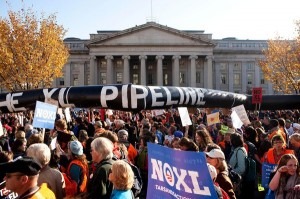If you haven’t already heard, there’s a rare feeling of success within the environmental community this week. The State Department has decided to delay the decision on the Keystone XL Pipeline until 2013. Though the pipeline is not definitively rejected, the delay will allow more time to explore the project's potential impact before a decision is made, and possibly re-route the 1,700 mile pipeline around environmentally-sensitive areas.
This is the issue that prompted 1,252 protesters to get arrested outside the White House during the summer, and another 12,000 to form a giant circle around the White House last week. All the signs had pointed to the pipeline getting approved - a decision that could have forever altered the Obama administration's already frayed relationship with the environmental community. Now, the President faces criticism that he put politics over job creation.
House Speaker John Boehner blasted the president, saying “By punting on this project, the president has made clear that campaign politics are driving U.S. policy decisions--at the expense of American jobs," Boehner said. "The current project has already been deemed environmentally sound, and calling for a new route is nothing but a thinly veiled attempt to avoid upsetting the president’s political base before the election.”
Activist and pipeline protest pioneer Bill McKibben had another take. “The people spoke, loudly, and thankfully the president heard…since we get few even partial victories on climate, this is a big day.”
The President did not directly concede that the protests drove the State Department's decision. But he did reference "a number of concerns have been raised through a public process" when stating his support for the delay.
The pipeline would bring oil from Canada’s tar sands to the Gulf of Mexico and built through the part of Nebraska that is home to the Nebraska Sand Hills, a thin layer of grass-covered dunes that lay atop the Ogallala aquifer. The aquifer and the highly permeable Sand Hills underlie 27% of the irrigated land in the U.S. and is a vital part of Nebraska’s environment. Should the pipeline ever leak or open, environmentalists say the damage to the aquifer would be irreversible. Nebraska ranchers had even called for it being re-routed. But there is equally strong support for the pipeline from the oil and gas industry, as well as labor unions. According to Boehner, the pipeline will create 20,000 American jobs.
With so many special interests having a stake in the pipeline, the non-decision has implications well beyond even that vast expanse of the aquifer as the decision will rest in the hands of whomever the President may be in 2013 when it comes to the table again. Both supporters and critics agree that the President listened to environmentalists on this issue, which may point to a major shift in the political dynamics of Washington.
